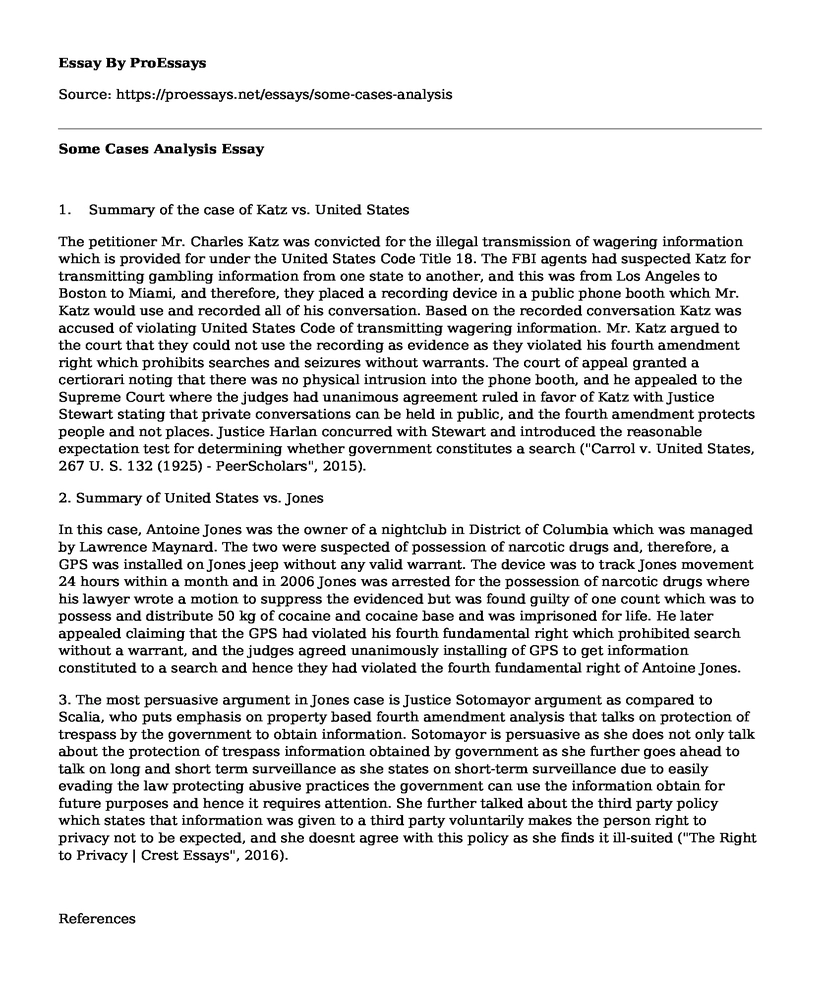1. Summary of the case of Katz vs. United States
The petitioner Mr. Charles Katz was convicted for the illegal transmission of wagering information which is provided for under the United States Code Title 18. The FBI agents had suspected Katz for transmitting gambling information from one state to another, and this was from Los Angeles to Boston to Miami, and therefore, they placed a recording device in a public phone booth which Mr. Katz would use and recorded all of his conversation. Based on the recorded conversation Katz was accused of violating United States Code of transmitting wagering information. Mr. Katz argued to the court that they could not use the recording as evidence as they violated his fourth amendment right which prohibits searches and seizures without warrants. The court of appeal granted a certiorari noting that there was no physical intrusion into the phone booth, and he appealed to the Supreme Court where the judges had unanimous agreement ruled in favor of Katz with Justice Stewart stating that private conversations can be held in public, and the fourth amendment protects people and not places. Justice Harlan concurred with Stewart and introduced the reasonable expectation test for determining whether government constitutes a search ("Carrol v. United States, 267 U. S. 132 (1925) - PeerScholars", 2015).
2. Summary of United States vs. Jones
In this case, Antoine Jones was the owner of a nightclub in District of Columbia which was managed by Lawrence Maynard. The two were suspected of possession of narcotic drugs and, therefore, a GPS was installed on Jones jeep without any valid warrant. The device was to track Jones movement 24 hours within a month and in 2006 Jones was arrested for the possession of narcotic drugs where his lawyer wrote a motion to suppress the evidenced but was found guilty of one count which was to possess and distribute 50 kg of cocaine and cocaine base and was imprisoned for life. He later appealed claiming that the GPS had violated his fourth fundamental right which prohibited search without a warrant, and the judges agreed unanimously installing of GPS to get information constituted to a search and hence they had violated the fourth fundamental right of Antoine Jones.
3. The most persuasive argument in Jones case is Justice Sotomayor argument as compared to Scalia, who puts emphasis on property based fourth amendment analysis that talks on protection of trespass by the government to obtain information. Sotomayor is persuasive as she does not only talk about the protection of trespass information obtained by government as she further goes ahead to talk on long and short term surveillance as she states on short-term surveillance due to easily evading the law protecting abusive practices the government can use the information obtain for future purposes and hence it requires attention. She further talked about the third party policy which states that information was given to a third party voluntarily makes the person right to privacy not to be expected, and she doesnt agree with this policy as she finds it ill-suited ("The Right to Privacy | Crest Essays", 2016).
References
Carrol v. United States, 267 U. S. 132 (1925) - PeerScholars. (2015). PeerScholars. Retrieved 6 March 2016, from http://peerscholars.com/carrol-v-united-states-267-u-s-132-1925/
The Right to Privacy | Crest Essays. (2016). Crestessays.com. Retrieved 6 March 2016, from http://www.crestessays.com/the-right-to-privacy/
Cite this page
Some Cases Analysis. (2021, Mar 10). Retrieved from https://proessays.net/essays/some-cases-analysis
If you are the original author of this essay and no longer wish to have it published on the ProEssays website, please click below to request its removal:
- Should Certain Crimes be Labeled as Hate Crimes Essay
- First Amendment: Religion and Education
- Scarcity of Resources in Healthcare Paper Example
- Essay Sample on High Tech Crimes
- Root Causes of Crimes in Low-Income, "Inner-City" Neighborhoods - Essay Sample
- Essay Example on Bonus Army: WWI Vets Fight for Rights
- Criminal Justice Policy Issue: Domestic Terrorism







